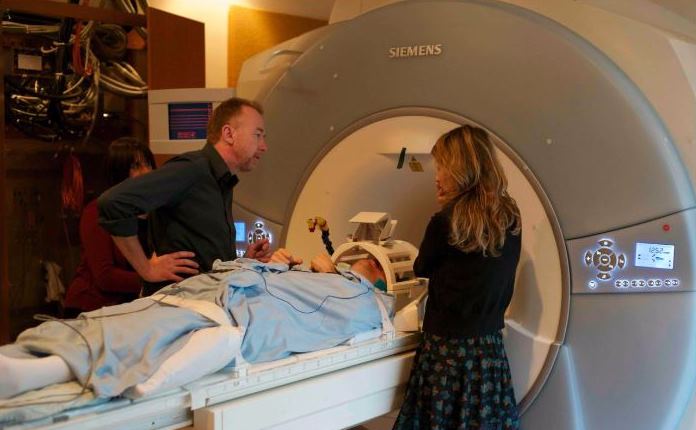Adrian Owen, one of the pioneers of the use of ‘mind reading’ to communicate with patients with serious brain injury appeared at a packed ‘in conversation’ event in the Science Museum last night.
During a Royal Society sponsored Lates, Adrian Owen discussed his attempts to use brain scanners to communicate with vegetative patients over two decades with Roger Highfield, Director of External Affairs and author of The Mind Readers
People in a ‘vegetative state’ are awake yet unaware. Although their eyes can open, they can smile, grasp another’s hand, cry, groan or grunt, they are unable to see or to understand speech. It is, says Owen, as if their minds are clamped firmly shut.
While working in Cambridge two decades ago, Owen made headlines worldwide by showing it was possible to use a brain scanner to find evidence of awareness in a supposedly ‘vegetative’ patient, Kate Bainbridge.
He showed that Kate could react to faces: her brain responses were indistinguishable from those of healthy volunteers. Of course, whether that response was a reflex or a signal of consciousness was, at the time, a matter of debate.
Unusually for these patients, Bainbridge surfaced from being vegetative six months after the initial diagnosis and described how she was indeed sometimes aware of herself and her surroundings.
She wrote to him:
Dear Adrian,
Please use my case to show people how important the scans are. I want more people to know about them. I am a big fan of them now. I was unresponsive and looked hopeless, but the scan showed people I was in there.
It was like magic, it found me.
Highfield and Owen also discussed the case of Scott Routley who had been diagnosed as vegetative since an accident on 20 December 1999, and was confirmed as vegetative in 2012.

Owen scanned Scott several times. By that time he had worked out how to communicate with patients trapped in the grey zone, by asking Routley to imagine playing tennis for yes, and navigating the house for no.
To his surprise, the patterns of brain activity in response to his questions showed Scott knew exactly who he was, and where he was and that he was actively choosing to answer the questions.
“My heart stopped when we asked Scott if, after 12 years, he was in pain,” Owen recalls. “Thankfully, the answer was no.”
With Highfield, the then editor of New Scientist, Prof Owen also conducted the world’s biggest intelligence test, the results of which were published in the journal Neuron.
Next month, Owen is going to launch the largest ever study of the effects of sleep on cognition by encouraging hundreds of thousands of volunteers to report on their sleeping habits and undergo online tests.
Later this year a book written by Owen will detail his extraordinary work on disorders of consciousness, entitled ‘Into the Grey Zone: A Neuroscientist Explores the Border Between Life and Death’.
You can listen to the full talk here.
Adrian Owen is the Canada Excellence Research Chair in Cognitive Neuroscience and Imaging at The Brain and Mind Institute, Western University, Canada.
If you would like to keep up to date with what’s happening at the museum you can sign up to our email newsletter.